|
|
|
Sort Order |
|
|
|
Items / Page
|
|
|
|
|
|
|
| Srl | Item |
| 1 |
ID:
091918
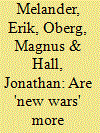

|
|
|
|
|
| Publication |
2009.
|
| Summary/Abstract |
It is widely believed that the human impact of civil conflict in the present era is especially destructive. Proponents of the 'new wars' thesis hold that today's conflicts are fuelled by exclusive identities, motivated by greed in the absence of strong states, and unchecked by the disinterested great powers, resulting in increased battle severity, civilian death and displacement. The ratio of civilian to military casualties is claimed to have tilted, so that the overwhelming majority of those killed today are civilians. Using systematic data that are comparable across cases and over time we find that, contrary to the 'new wars' thesis, the human impact of civil conflict is considerably lower in the post-Cold War period. We argue that this pattern reflects the decline of ideological conflict, the restraining influence of globalization on governments, and the increasing rarity of superpower campaigns of destabilization and counter-insurgency through proxy warfare.
|
|
|
|
|
|
|
|
|
|
|
|
|
|
|
|
| 2 |
ID:
059699
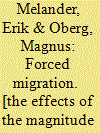

|
|
|
|
|
| Publication |
Sweden, Department of peace and conflict research, 2004.
|
| Description |
28p.
|
| Series |
Uppasala peace research papers; no.8
|
| Standard Number |
9150617850
|
|
|
|
|
|
|
|
|
|
|
|
Copies: C:1/I:0,R:0,Q:0
Circulation
| Accession# | Call# | Current Location | Status | Policy | Location |
| 049220 | 325/MEL 049220 | Main | On Shelf | General | |
|
|
|
|
| 3 |
ID:
066927


|
|
|
| 4 |
ID:
087483


|
|
|
|
|
| Publication |
2009.
|
| Summary/Abstract |
This article explores to what extent the security dilemma through geographically induced first-strike advantages is a contributing cause of ethnic warfare. If there are possibly decisive advantages to be gained from striking the first blow, both temptation and fear may shortcut efforts to resolve a conflict in less costly ways, and trigger massive violence. Theoretical work and case studies suggest that in ethnic conflicts intermingled settlement patterns give rise to such first-strike advantages. I test whether ethnic groups in conflict are more likely to become involved in ethnic warfare if their main region of settlement is ethnically diverse. I also include controls intended to capture other aspects of the security dilemma. In robustness tests, I add indicators of group concentration and local majority status that have been found to increase the risk of ethnic violence in previous quantitative studies. I find a strong, statistically significant association between regional ethnic diversity and ethnic warfare.
|
|
|
|
|
|
|
|
|
|
|
|
|
|
|
|
| 5 |
ID:
122903
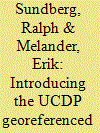

|
|
|
|
|
| Publication |
2013.
|
| Summary/Abstract |
This article presents the UCDP Georeferenced Event Dataset (UCDP GED). The UCDP GED is an event dataset that disaggregates three types of organized violence (state-based conflict, non-state conflict, and one-sided violence) both spatially and temporally. Each event - defined as an instance of organized violence with at least one fatality - comes with date, geographical location, and identifiers that allow the dataset to be linked to and merged with other UCDP datasets. The first version of the dataset covers events of fatal violence on the African continent between 1989 and 2010. This article, firstly, introduces the rationale for the new dataset, and explains the basic coding procedures as well as the quality controls. Secondly, we discuss some of the data's potential weaknesses in representing the universe of organized violence, as well as some potential biases induced by the operationalizations. Thirdly, we provide an example of how the data can be used, by illustrating the association between cities and organized violence, taking population density into account. The UCDP GED is a useful resource for conflict analyses below the state and country-year levels, and can provide us with new insights into the geographical determinants and temporal sequencing of warfare and violence.
|
|
|
|
|
|
|
|
|
|
|
|
|
|
|
|
| 6 |
ID:
075101


|
|
|
|
|
| Publication |
Uppsala, Department of peace and conflict research, 2006.
|
| Description |
41p.
|
| Series |
Uppsala Peace Research Papers No. 9
|
| Standard Number |
9150618970
|
|
|
|
|
|
|
|
|
|
|
|
Copies: C:1/I:0,R:0,Q:0
Circulation
| Accession# | Call# | Current Location | Status | Policy | Location |
| 051955 | 303.66/MEL 051955 | Main | On Shelf | General | |
|
|
|
|
| 7 |
ID:
153243
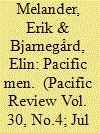

|
|
|
|
|
| Summary/Abstract |
The gender gap in attitudes to foreign policy is well established in public opinion literature. Studies have repeatedly reported that women tend to be more peaceful and less militaristic than men. This article reexamines attitudes of individuals in relation to foreign policy and pits the gender gap against the largely forgotten feminist gap. We argue that the individual-level relationship between gender equality attitudes on the one hand, and tolerance and benevolence on the other, is under-researched, but also that key contributions about the effects of feminism have been mostly ignored in research on the gender gap in public opinion. We return to the notion of a causal relationship between gender equality attitudes, and peaceful attitudes, and of a feminist gap that also exists among men. In a series of novel empirical tests, we demonstrate that attitudes to gender equality, not biological sex, explain attitudes towards other nationalities and religious groups. Using individual-level survey data from five countries around the Pacific: China, Indonesia, Japan, South Korea, and the United States of America, we show that both men and women who reject gender equality are much more hostile both to other nations and to minorities in their own country.
|
|
|
|
|
|
|
|
|
|
|
|
|
|
|
|
| 8 |
ID:
060254


|
|
|
| 9 |
ID:
150989
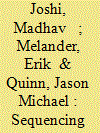

|
|
|
|
|
| Summary/Abstract |
Once a set of civil war actors reach a final peace agreement, a number of different implementation sequences are possible as the negotiated provisions are put into practice. We focus on a key but threatening stepping stone in the post-accord period—the holding of the first post-accord election—which has the capacity to be a stabilizing or destabilizing force. We identify effective accommodation provisions that civil war actors can negotiate and implement before the first post-accord election to reduce the chances of renewed violence. Utilizing new longitudinal data on the implementation of comprehensive peace agreements between 1989 and 2012 and a series of survival models, we find that if the first post-accord election is preceded by the implementation of accommodation measures, elections can have a peace-promoting effect. However, in the absence of preelection accommodation measures, elections are much more likely to be followed by peace failure
|
|
|
|
|
|
|
|
|
|
|
|
|
|
|
|
| 10 |
ID:
077773


|
|
|
|
|
| Publication |
2007.
|
| Summary/Abstract |
Civil war and other forms of generalized violence have been identified as the main determinants of forced migration. Yet, there are still large variations across armed conflicts that have not been accounted for. In this article we examine new measures of armed conflict that indicate the magnitude and scope of fighting. We find that the geographical scope of fighting and the extent to which urban centres are affected determine a significant portion of the variation in the expected number of forced migrants across conflicts. Contrary to our expectations, our results show that the intensity of the armed conflict is not significantly related to the number of forced migrants. These findings suggest that the threat perceived by potential forced migrants is more related to where the fighting is taking place, than to the overall intensity of the fighting
|
|
|
|
|
|
|
|
|
|
|
|
|
|
|
|
|
|
|
|
|